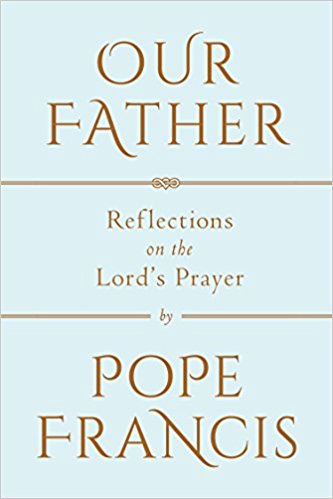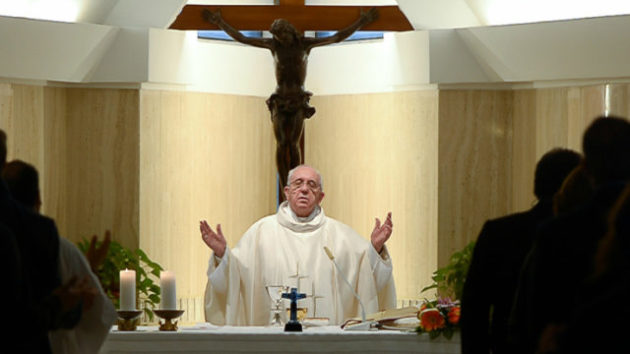Pope Francis Reflect’s on the Lord’s Prayer: Up from Orphanism
Brad Miner read some reflections by Pope Francis on the Lord’s Prayer and concludes we’ve come a long way from Benedict XVI and St. John Paul II.
 Pope Francis has allowed to be published a “book” about what a priest in my parish calls “our family prayer,” Our Father: Reflections of the Lord’s Prayer, which arose from a TV interview he did with an Italian prison chaplain, Marco Pozza.
Pope Francis has allowed to be published a “book” about what a priest in my parish calls “our family prayer,” Our Father: Reflections of the Lord’s Prayer, which arose from a TV interview he did with an Italian prison chaplain, Marco Pozza.
This hastily thrown together little book – made up of fragments from that interview as well as remarks from general audiences and his Angelus talks – presents Francis at his most capricious. Thus the pope’s Preface opens:
Father.
Without saying this word, without taking it to heart, we cannot pray.
To whom do I pray? Almighty God? Too far away. I cannot feel that he is near. Even Jesus did not refer to God as “the Almighty God.”
He goes on in this anodyne fashion for 120+ widely spaced pages, constituting ten chapters, each devoted to a phrase from the Lord’s Prayer.
Of the prayer’s title and its opening phrase, Fr. Pozza asks the pope to explain “what it feels like for you pray the Our Father.”
The pope responds that he finds the prayer “reassuring;” that it reminds him he’s not an orphan. He has a “dad.”
God is a dad who warns, “Pay attention, look out for this,” he is saying. . . . I think that today the world has somewhat lost the meaning of fatherhood. It is a world sick with orphanism. . . .Jesus says to us that it will be the poor, the sinners, the prostitutes, the discarded who enter before you into the kingdom of heaven, all.
That’s a direct quote from the pope’s chat with Pozza, but the lack of editorial attention here is appalling. Perhaps in speaking the pope added that “all” at the end of his words (an oral tic), but why on earth should that have made it into the published version?
The pope’s point is that God is not one’s “private property,” which is why the word “Father” is preceded by the word “our.” This lacks the intellectual depth of his two predecessors, but I suppose one ought not to dwell on that.
There follows some hectoring by the Holy Father that “we have gone so far as to affirm that ours is a ‘fatherless society.’” This is especially true in the West, he says, where father figures are “seen as being symbolically absent, vanished, removed.”
Whatever does “symbolically absent” mean?
His view that in the past “authoritarianism, even tyranny in certain cases, held sway in some homes” and that children were treated as slaves is presented without supporting data, and it occurred to me reading this screed, that the pope’s off-the-cuff style (so familiar from his Alitalia flights), resembles no other public figure so much as Donald Trump on Twitter.
In any case, exactly what this pop sociology has to do with Christianity’s greatest prayer is unclear. If his point is that it’s hard to believe in THE Father if you have no faith in your own (biological) daddy, I’m not sure I’ve ever read anything quite so jejune.
Fr. Pozza now turns to “Who art in heaven,” and he is struck by the closeness of “those who say ‘Daddy,’ but at the same time by the distance.” And so he asks: “What is meant by ‘heaven’?”
The pope opines that ‘heaven’ means the greatness of God, “the immensity of his power,” and he cites Genesis 17:1 when Yahweh says to Abraham, “I am God Almighty; walk before me, and be blameless.”
So . . . it’s okay for the Father to refer to himself as “Almighty,” even though Jesus never did. I thought of Walt Whitman: “Do I contradict myself? Very well, then I contradict myself, I am large, I contain multitudes.”
The pope then gives the helpful example of when, at 6, he had his tonsils removed, which, he says, the doctors did without anesthesia. Afterward, they gave him ice cream. In a taxi home from the hospital, little Jorge was stunned when his father paid the driver. “I thought my dad owned all the cars in the city!” That other papa Bergoglio set the boy straight, “which gives us,” his son the pope says, “an idea of our relationship with God.” To wit:
God is a God of glory, but he walks with you and when it is necessary, he even gives you ice cream.
As Abraham in heaven might remark, “Oy . . .”
Next, the pope explains that “hallowed be thy name” means God’s name “should be hallowed.”
To say “Thy kingdom come” means to show mercy. It is “to be a beggar.” Pope Francis refers to the Parable of the Mustard Seed: the “kingdom is . . . a reality that in human terms is small and apparently irrelevant,” and one must “not trust in one’s own capabilities” but be a humble participant in God’s work.
Something here must be getting lost in translation. I sure hope so.
I skip ahead now to the part that last December led to controversy when, in the televised with Fr. Pozza, the Holy Father suggested that “lead us not into temptation” is incorrect. In the translated text it is: “This . . . is not a good translation.” Pope Francis mentions that the most recent Italian and French translations (“do not abandon me” and “do not let me fall”) are better since they do not suggest that it is God “who tosses me into temptation.” It’s Satan who does that.
There may be merit in this, although the old phrase has served pretty well for a very, very long time.
That televised interview ended with the great prayer itself, in which the pope and the priest recited together: “And lead us not into temptation . . .”
Walt Whitman would no doubt grin to know that a pope may also contain (contradictory) multitudes.
![]()
Brad Miner
Brad Miner is senior editor of The Catholic Thing, senior fellow of the Faith & Reason Institute, and Board Secretary of Aid to the Church In Need USA. He is a former Literary Editor of National Review. His new book, Sons of St. Patrick, written with George J. Marlin, is now on sale. The Compleat Gentleman, is available on audio.
EDITORS NOTE: © 2018 The Catholic Thing. All rights reserved. For reprint rights, write to: info@frinstitute.org. The Catholic Thing is a forum for intelligent Catholic commentary. Opinions expressed by writers are solely their own. The featured image is of Pope Francis saying the Our Father during Mass at the Casa Santa Marta [May 2015].



Leave a Reply
Want to join the discussion?Feel free to contribute!